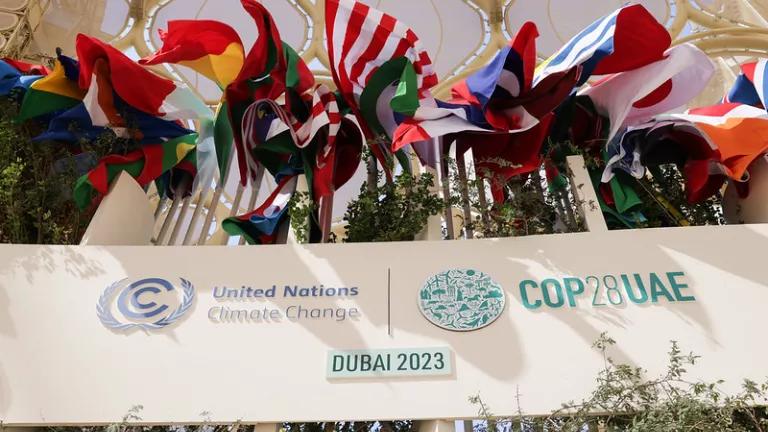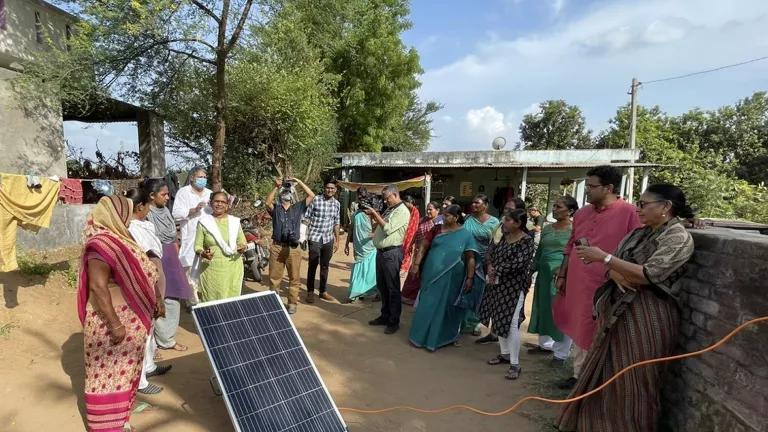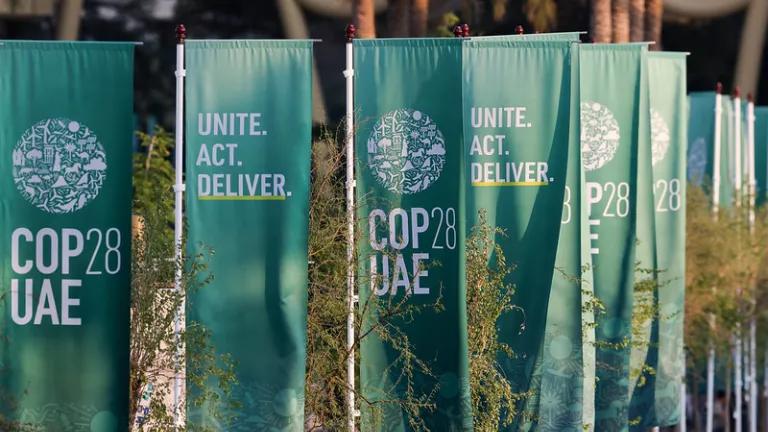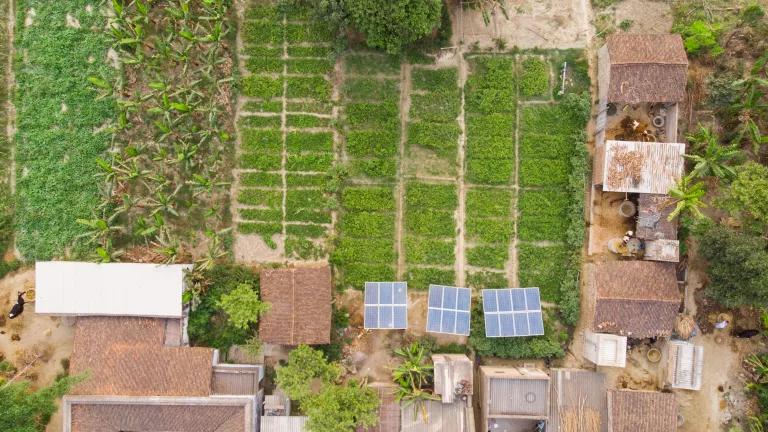Taking Climate Action Forward: India Key to Dubai Climate Talks
Highlights of India’s actions on climate change since the 2015 Paris Agreement and what to expect at COP28 in Dubai

COP28 venue in Dubai, United Arab Emirates
UNFCCC Flickr
With the window to limit global warming to 1.5 degrees Celsius rapidly closing, COP28 kicked off in Dubai today and world leaders gathered for the opening ceremony of the World Climate Action Summit. This year's climate talks will be particularly focused on the First Global Stocktake, which recognizes that, despite significant progress since the 2015 Paris Agreement, we are still off-track in meeting its goals. India, home to a sixth of all humanity, is absolutely key to the success of COP28 and to the world’s response in the fight against climate change. Indian Prime Minister, Narendra Modi, in his remarks at the opening ceremony, urged all countries to rise above self-interest and deliver on their climate obligations.
India’s Progress since Paris
Prime Minister Modi emphasized that India is poised to be one of four big economies – India, Indonesia, the UK, Switzerland – set to meet its Paris Agreement goals. In the run up to the climate conference every year, NRDC and partners publish an annual summary of India’s climate actions. Our latest report, The Road from Paris: India’s Progress Towards its Climate Pledge, published today, takes a look at India’s climate leadership at the G20 summit, progress on expanding renewable energy and reducing emissions intensity, investment in green hydrogen, while at the same time strengthening resilience to extreme heat and other climate stressors.

Three issues are going to be key at COP28, from India’s perspective: advancing climate action domestically, emphasizing climate equity and finance, and building global support for collective action.
Advancing climate action
In 2021, at COP26 in Glasgow, India announced a target to achieve net zero emissions by 2070. India has taken several steps towards decarbonizing its economy. The renewable energy sector especially continues to drive India’s climate action. Globally, India ranks fourth in renewable energy installed capacity (excluding large hydro), fourth in wind power capacity and fifth in solar power capacity. India’s solar growth has been largely led by utility-scale solar—large scale solar projects were 87 percent of installations in 2022, a 33 percent year on year increase. The National Green Hydrogen Mission aims to accelerate the deployment of green hydrogen a clean energy source and put India firmly on the path to decarbonization. Today, Prime Minister Modi said that India is committed to and on track to achieve its Nationally Determined Contributions, and highlighted that India has achieved its emission intensity targets 11 years ahead of the committed timeframe.

A worker installing rooftop solar panels on a building in rural India
iStock
Emphasizing climate equity and finance
Moving into COP28, India is reiterating its position on common but differentiated responsibility and calling out the developed world to meet its promises on finance to encourage and enable global efforts towards the clean energy transition. India’s long-standing position on equity and historical responsibility is captured it its submission to the First Global Stocktake: “it is considered unfair if those who have contributed the most to the problem do not contribute more to the solution than those whose contribution is much smaller.”
Prime Minister Modi called on the rich nations to go faster on its net zero goals, and pushed for concrete and real progress on a New Collective Quantified Goal to cover mitigation, adaptation and mobilize the required funds. India also called for a replenishment of the Green Climate Fund and Adaptation Fund, and for affordable finance to be made available for climate action by multilateral development banks. Analysis shows emerging markets and developing countries other than China need $1 trillion dollars per year to make progress on key climate action by the end of the decade.
Building support for collective climate action
In 2023, India assumed the presidency of two major international forums – the G20 and the Clean Energy Ministerial – and consistently advocated for low-carbon transition solutions for Global South countries that balance development with emissions reductions. India championed the issue of energy access and energy efficiency during its G20 presidency, and the G20 New Delhi Leaders’ Declaration steered consensus around tripling of renewable energy capacity and doubling the rate of energy efficiency globally, which are recognized as a major goal at this year’s COP agenda. India has also launched the Global Biofuels Alliance with Brazil and the United States, which aims to bring together governments, international organizations and industry to facilitate the uptake of biofuels globally. Today, India launched the Global Green Credit Initiative, which will be a mechanism to incentivize voluntary pro-planet actions, as an effective response to the challenge of climate change.
With the proposal to host COP33 in the year 2028, India is continuing to take a lead on climate action, and its leadership at the climate talks will not only be consequential for its 1.4 billion inhabitants but will have a profound impact on the future of our planet.
NRDC Experts will be on the ground at COP28, please follow here for our events lineup and regular updates.





